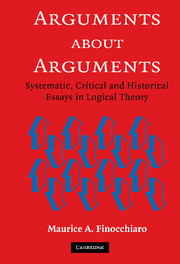Book contents
- Frontmatter
- Contents
- Preface and Acknowledgments
- Introduction : An Approach to a Branch of Logic
- Theorizing about reasoning and argument
- Fallacies and asymmetries
- Critiques
- 10 Siegel on Critical Thinking : Reasoning versus Rationality versus Criticism (1989)
- 11 Induction and Intuition in the Normative Study of Reasoning : Cohen on Inductive Reasoning in Philosophy (1991)
- 12 Logic, Politics, and Gramsci
- 13 The Dialectical Approach to Interpretation and Evaluation : From Axiom to Dialogue (Barth) and from Structure to Dialogue (Freeman) (1995)
- 14 The Port-Royal Logic's Theory of Argument
- 15 A Critique of the Dialectical Approach, Part Ⅱ : The Amsterdam School and Walton on Complex Dialogues (1999)
- 16 Valid Ad Hominem Arguments in Philosophy
- 17 Dialectics, Evaluation, and Argument : Goldman and Johnson on the Concept of Argument (2003)
- Historical analyses
- Selected Bibliography
- Index
15 - A Critique of the Dialectical Approach, Part Ⅱ : The Amsterdam School and Walton on Complex Dialogues (1999)
from Critiques
Published online by Cambridge University Press: 05 February 2015
- Frontmatter
- Contents
- Preface and Acknowledgments
- Introduction : An Approach to a Branch of Logic
- Theorizing about reasoning and argument
- Fallacies and asymmetries
- Critiques
- 10 Siegel on Critical Thinking : Reasoning versus Rationality versus Criticism (1989)
- 11 Induction and Intuition in the Normative Study of Reasoning : Cohen on Inductive Reasoning in Philosophy (1991)
- 12 Logic, Politics, and Gramsci
- 13 The Dialectical Approach to Interpretation and Evaluation : From Axiom to Dialogue (Barth) and from Structure to Dialogue (Freeman) (1995)
- 14 The Port-Royal Logic's Theory of Argument
- 15 A Critique of the Dialectical Approach, Part Ⅱ : The Amsterdam School and Walton on Complex Dialogues (1999)
- 16 Valid Ad Hominem Arguments in Philosophy
- 17 Dialectics, Evaluation, and Argument : Goldman and Johnson on the Concept of Argument (2003)
- Historical analyses
- Selected Bibliography
- Index
Summary
Introduction
This chapter is part of a project designed to explore the nature of the dialectical approach in argumentation theory, its relationship to other approaches, and its methodological fruitfulness. The main motivation underlying this project stems from the fact that the dialectical approach has become the dominant one in argumentation theory; now, whenever a given approach in any field becomes dominant, there is always the danger that it will lead to the neglect or loss of insights which are easily discernible from other orientations; this in turn may even prevent the dominant approach from being developed to its fullest as a result of the competition with other approaches.
In a previous paper (Finocchiaro 1995b), I undertook a critical examination of two leading examples of the dialectical approach. I argued that Barth and Krabbe's (1982) demonstration of the equivalence of the methods of axiomatics, natural deduction, and formal semantics to formal dialectics works both ways, so that the former acquire the merits of the latter, and the latter the limitations of the former. I also argued that Freeman's (1991) demonstration that the structure of arguments as products derives from the process of argumentation is insufficiently dialectical insofar as it involves a conception of dialectics in which dialogue is easily dispensable, and insofar as it suggests that argument structure is rooted more in an evaluative process than in a process of dialogue between distinct interlocutors.
Information
- Type
- Chapter
- Information
- Arguments about ArgumentsSystematic, Critical, and Historical Essays In Logical Theory, pp. 265 - 276Publisher: Cambridge University PressPrint publication year: 2005
